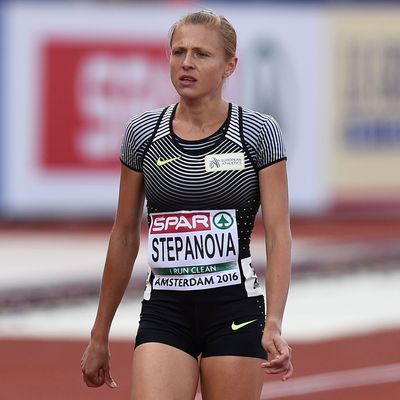
In December of 2014, Yulia Stepanova and her husband, Vitaly Stepanov, slipped out of Russia and set up a home at an undisclosed location in Germany. The Stepanovs had good reasons to be protective of their whereabouts: Yulia, an 800-meter runner for Russia’s national team, had been secretly recording her coaches and fellow runners between February 2013 and November 2014 as they described the team’s use of performance-enhancing drugs. She and her husband brought their evidence to a filmmaker named Hajo Seppelt, who worked for the German-based TV network ARD. Her recordings would become the basis for a documentary in which Seppelt called into question Russia’s incredible performance in the 2014 Sochi Olympics. That was only the beginning of what has developed into one of the worst scandals in the history of the Games. Along the way, it would show just how flawed the Olympic anti-doping regime has become.
Yulia and Vitaly first met in 2009, when he worked for Russia’s state-run anti-doping agency and she was a championship runner. (After moving to the United States earlier this year, the two shared their story in their first American interview with 60 Minutes in May.) Vitaly was a true believer in the importance of keeping performance-enhancing drugs out of sports, and he was shocked to learn from Yulia that doping was a common practice among Russian athletes, encouraged by coaches and covered up by his own anti-doping agency. Though the two got married later that year, their disagreement over the practice of doping would become a major point of contention: By 2011, Vitaly had been fired from the anti-doping agency for being too critical of what he saw as a culture of corruption there. By 2012, the couple began filing the paperwork for divorce. Yulia, who’d had a leg injury that year that would keep her from the London Summer Games, began focusing on qualifying for Rio in 2016. But in 2013, she found out that she tested positive for a prohibited substance — despite her belief that Russian officials would make sure she wasn’t caught — and would be banned from competition for two years by the International Association of Athletics Federation. Russian officials told Yulia to quietly accept her punishment. She became angry, thinking of how unfair it was that she should suffer punishment when the practice was so widespread.
The report went off like a bomb in the sports world. Russian president Vladimir Putin and his allies dismissed the decision as part of a Western-backed plot against the country, but it was clear that the controversy was taken seriously.
Stepanova reunited with her husband and began surreptitiously recording fellow athletes and coaches as they described their doping regimens. Seppelt’s documentary led the World Anti-Doping Agency to launch its own investigation, and by the end of last year, it had released a 323-page report outlining the extent of Russia’s state-run doping scheme. Stepanova, who was the agency’s key witness, helped the organization lay out in detail how Grigory Rodchenkov, the head of Russia’s anti-doping agency, oversaw the tampering of more than 1,400 urine samples.
Strange things started happening in Russia. On February 3 of this year, the founding chairperson of Russia’s state-led anti-doping agency — who resigned in disgrace after the report came out in December — died unexpectedly. No cause of death was given. Less than two weeks later, a former director for the agency also died — officials said of a heart attack. Fearing for his life, Rodchenkov fled to the United States. In May, he went to the New York Times and detailed how he fed athletes a cocktail of performance-enhancing drugs mixed into alcohol — whiskey for men, Martini vermouth for women — and then participated in an elaborate ruse to replace their tainted urine samples with clean ones through a hole in the wall at the anti-doping lab headquarters. In 2014, Russian athletes won more medals than any other country — a dramatic improvement over their 2010 performance at the Winter Games in Vancouver, when they won the sixth most.
The International Association of Athletics Federations — the world governing body for track and field — banned the entire Russian team from competing in the 2016 Games. Last month, when another report from a Canadian law professor proved that Russia had hidden hundreds of positive test results between 2011 and 2015, the World Anti-Doping Agency called for a blanket ban on Russians competing in the Games.

The International Olympic Committee met last week to decide whether to allow Russia to compete. But rather than send a strong message about the consequences of cheating, they passed off responsibility to the international federations of each sport, asking them to judge each athlete individually, and setting off a scramble to determine who would be able to compete in the 2016 Games that will likely be lawyered right up until the Opening Ceremonies. The implication — that athletes who’ve gotten away with doping in the past might be able to compete — is driving potential viewers away, according to a BBC World poll last month.
But it also pointed to how badly the attempts to police doping on a world scale have failed. Individual athletes who are caught using prohibited substances face harsh punishments, including suspensions and having their medals revoked. Subsequent offenses can mean a lifetime ban. But the Russian doping scandal suggests that state-sponsored doping programs get a pass. “We missed a moment in time to honor the world’s clean athletes and send a bold message to the world that corruption, cheating and manipulating sport will not be tolerated,” one Canadian Olympian told reporters last week.”We matched a lion’s roar with a kitten’s purr.”
Stepanova has learned the uneven application of justice the hard way. After her efforts to expose the full extent of the Russian program, the World Anti-Doping Agency and the IAAF recommended she be allowed to compete as a neutral athlete for her efforts in blowing the whistle on state-sponsored doping. But the IOC announced last week that Stepanova was banned from competing in the Games. The reason: the positive test from 2013 that got her to expose the program in the first place. In other words, Stepanova got punished for getting caught. But the athletes who used drugs and didn’t get busted still have a chance.





























